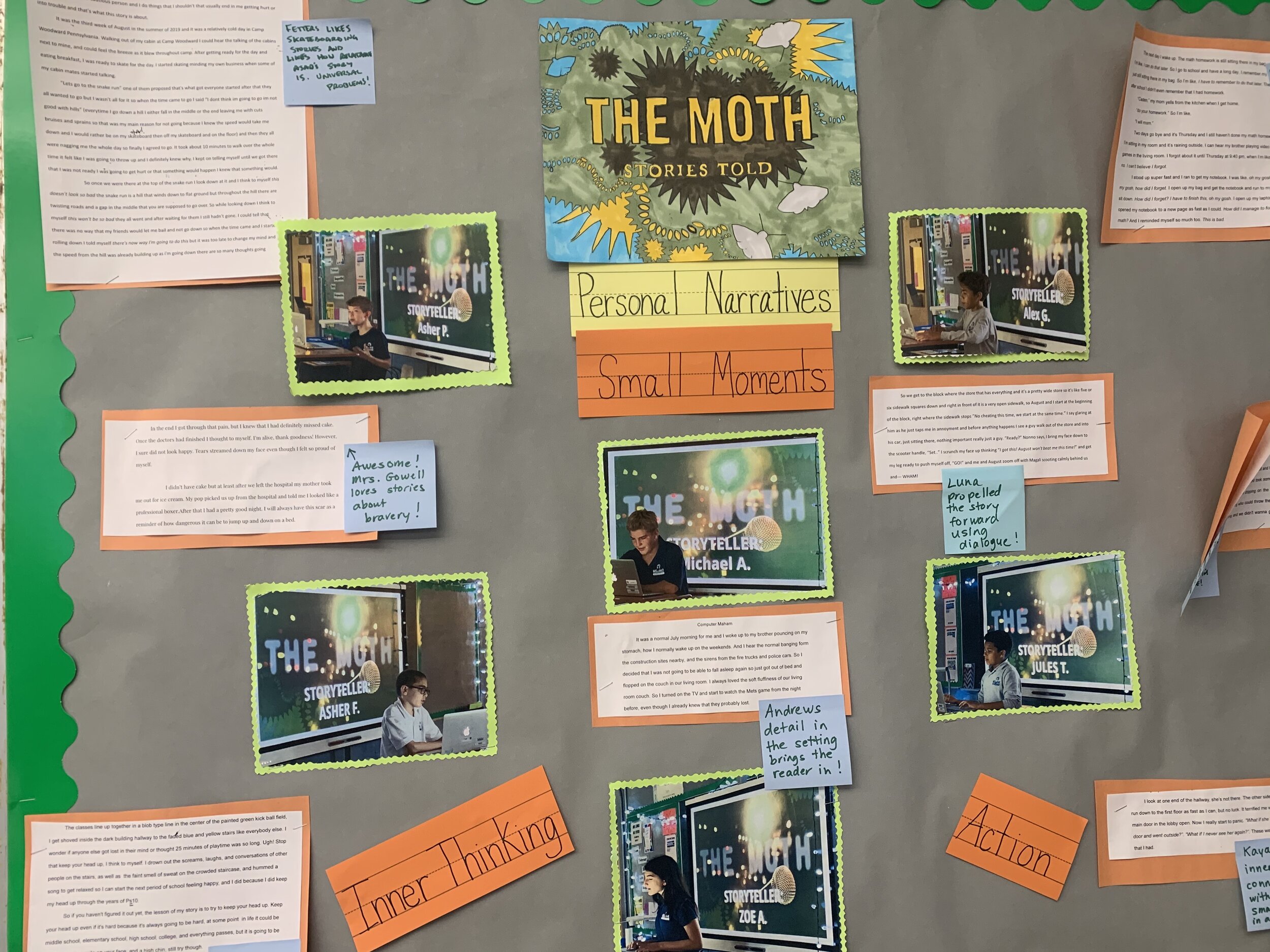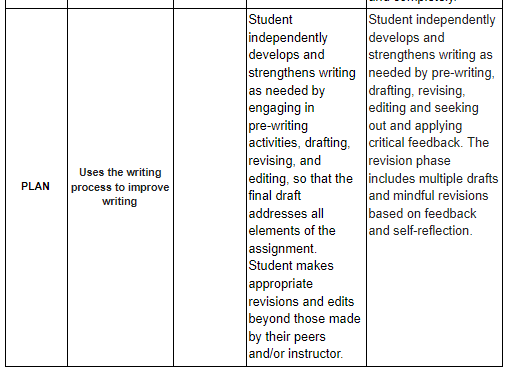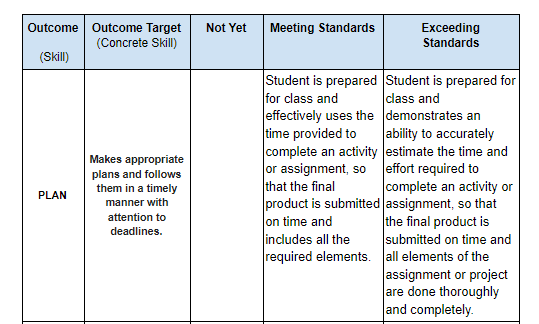Hello, MC Community!
As promised, here’s part 2 of a special edition of “Dear MC.” Instead of responding to a question we got from you, we asked teachers to weigh in on a topic that is quite germane and useful during remote learning: How to deal with missing student work.
During a pandemic-related period of remote learning, students face many obstacles in accessing and engaging in academic work. Remote learning and COVID-19 have rekindled and recontextualized conversations about how best to handle missing work. Now and always, what’s the most meaningful and helpful way to support students who are not turning in classwork?
This issue sits at the nexus of mastery-based and culturally responsive-sustaining education—so the Mastery Collaborative community has a lot to offer. Below, two educators describe their in-school systems for addressing missing work. You’ll see that much of their advice holds in a remote learning context, because their systems are based on equitable, student-centered approaches.
For more, check out Part 1 of the series here.
Thanks again and always to teachers who shared ideas and practices— Meg for the MC program team
Hi, MC,
I check in individually with students who aren't turning things in. I run my class following the workshop model, so this makes sense for me. I'll also email kids and call families when it might be helpful.
I've experimented with not accepting upgrades (revised work) for late work in the past, but the students who were dealing with that consequence were disproportionately boys, minorities, and/or students with IEPs. It didn't feel right, so I don’t do that anymore.
All the best,
Sam Fetters, Esteemed Mastery Practitioner
In Sam’s classroom, students participate in his version of “The Moth” storytelling to practice personal narratives & small moments writing.
At a recent MC Living Lab visit: students in Sam’s class give each other peer feedback.
Sam has worked with youth aged 8 mos to 88 years, but he really likes middle schoolers. He teaches 7th Grade ELA at MS 442 in Windsor Terrace, Brooklyn.
As students encounter obstacles to access and engagement during remote learning, teachers are creating and adapting systems to support them with realistic strategies for undertaking academic work to the extent that is possible, to check on and celebrate progress, and to give feedback to support the whole process.
Some schools are now looking to next year with new realizations about the importance of supporting executive function. Below, one practitioner walks us through her system for this, definitely for an in-school context—but with implications for next school year!
Hi MC,
So happy to weigh in!
In our approach to Mastery, our school uses 10 school-wide shared "Outcomes" or skills. These skills are used by all teachers in all grades and subjects. Two of the 10 Outcomes include PLAN and COLLABORATE. Students receive feedback on their ability to "plan" for the process of completing an assignment on time, to "plan" and be ready for a presentation, etc.
More specifically about my classes: Students who are writing an essay will be assessed on two "Plan" Outcomes Targets for Humanities, included below for your reference.
From the start, we focus on "Plan: Using the Writing process to improve writing." I teach into and grade the actual PROCESS of the essay: will a student brainstorm, outline, create a draft, peer-revise, give and receive feedback, make edits, etc? All of these components are mini lessons that I teach into and give students in class time to complete. I use the rubric below to figure out whether students are Meeting or Exceeding the standard in the writing process.
Rubric for "Plan: Uses the writing process to improve writing”, from MC Living Lab School The Young Women’s Leadership School of Astoria.
2) I will then focus on another "Plan Outcome: Makes Appropriate Plans ... with attention to Deadline." If a student submits their essay on time they will get a Meeting or Exceeding Standards for the submission. That shows me that the student can "plan for" deadlines and submit work on time. If a student does not submit the essay on time, she will get a "Not Yet" because she "cannot yet demonstrate that she can follow deadlines. However, she still must complete the assignment so that I can grade other outcomes and her actual writing. For example, just because she is "not yet skilled" at adhering to deadlines does not mean that she cannot "Argue, Communicate, Be Precise or Conclude" in her essay (these are other outcomes). In other words, her writing skills have nothing to do with her planning skills. She might have a “Not Yet” in Plan but end up getting a “Meeting Standards” or “Exceeding Standards” in 5 other outcomes. If she does not submit the essay at all, I cannot see how her writing is and therefore I will say this evidence is missing and wait until she does it. If she never does, she can have 6 “Not Yets” which is not ideal for her in any way.
Rubric for "Plan: with attention to deadlines”, from MC Living Lab School The Young Women’s Leadership School of Astoria.
The other part of your question is about whether we allow students to make up work. Yes, of course! Outcomes-based Grading is about MASTERING a skill and having multiple opportunities to show that you have mastery of that specific skill. So, again, if the student does not submit the essay she will get an “Not Yet” but she must "make it up" so other outcomes can get graded. However, the Plan grade won't change. She can't make up that she did not submit it on time, but she can demonstrate that she can submit the next assignment on time and adhere to new deadlines. Ultimately, she has all year to show that she can generally adhere to deadlines in various assignments for an Meeting Standards or Exceeding Standards.
Xenia Thomopolous is a teacher at TYWLS-Astoria, and a Mastery Collaborative Mentor.
The same would hold true for projects: students are graded on the process of creating the film or presentation or ted-talk or whatever, and also the submission of that final product on the date it is due. Again, if the project is not submitted on time the student needs to demonstrate that she has "met the standards" of the other Outcomes (Create, Communicate, Innovate, etc) or else she will have 5 NYs instead of 1.
I attached the Plan rubric below, and two other Google Docs - one with the Plan and Collaborate Rubric and one on a project I recently did in my AP Lit. class.
The general gist is: Teach into the process of planning and then grade the process, and teach into the importance of deadlines and then grade that. The other skills are other skills.
I hope this helps!!
Best,
Xenia Thomopoulos, Esteemed Mastery Practitioner
Xenia Thomopoulos has worked at The Young Women's Leadership of Astoria for 8 years. She has developed and taught curriculum with a Project-based/Mastery-based mindset in an array of secondary courses including: AP Literature, ELA 12, ELA Regents, Filmmaking, Photography, & Advisory. She also acts as a film liaison for her school’s collaborations with TFI, MOMI, & LPZ / HBO. Xenia has been involved with Mastery at TYWLS from the onset of her career, and now mentors new teachers, presents at conferences like NCGS, and hopes to spread her passion nationally and learn from educators who do this work internationally by partnering with them in cultural pedagogical exchanges.
Huge thank you to Sam and Xenia for sharing their ideas. What would you add? How are you thinking about supporting executive function next year?
Drop us a line at team@masterycollaborative.org.






